“Finding Home in Boomtown” chronicles a family’s journey from six-figure oilfield job to living with and helping the homeless.
“And He said to them, ‘Follow Me, and I will make you fishers of men.’ Immediately they left their nets and followed Him.”
Matthew 4:18-20, NASB
“He is no fool who gives what he cannot keep to gain what he cannot lose.” South American missionary Jim Elliot
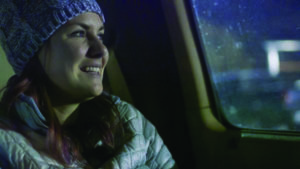 For John-Mark and Briana Echols, the leaving of their nets was less immediate than the way it happened for Peter and Andrew, but the call was no less clear.
For John-Mark and Briana Echols, the leaving of their nets was less immediate than the way it happened for Peter and Andrew, but the call was no less clear.
“When we first got into working with the homeless, I really didn’t know that we had such a homeless problem here in Midland—and I really didn’t understand homelessness at all,” said John-Mark.
He and Briana were invited to help with Church Under the Bridge, a homeless ministry, in 2012. Armed with the common notions about the roots of homelessness, they were unprepared for what they actually saw.
“Quickly, when we met people and started to hear stories and understand their situation a little better, that just sort of changed everything for us and grabbed ahold of our hearts,” he recalled. Over the next two years the couple, who married in 2013, became increasingly involved in more varied phases of homeless ministry, culminating in an invitation to tour Community First Village in Austin. Community First has built a neighborhood of tiny homes, along with a clinic, a grocery store, and other services to help the chronically homeless—which the Echolses later decided to duplicate in Midland.
They named their efforts The Field’s Edge, from Leviticus 23:22: “When you reap the harvest of your land, moreover, you shall not reap to the very corners of your field nor gather the gleaning of your harvest; you are to leave them for the needy and the alien. I am the Lord your God.”
The Kenneth Huseman Family Partnership has donated 23.5 acres just south of I-20 between Midland’s west Loop 250 and the International Space Port. If funding goals are met and city and county boards give needed approval, the Echolses hopes to break ground on the village in June of 2020.
After visiting the Austin community, John-Mark said he saw a need but didn’t yet hear a call. “As I came back and really started to consider what that would look like for Midland, I didn’t ever really expect that it would be me that would head up that project,” Echols said.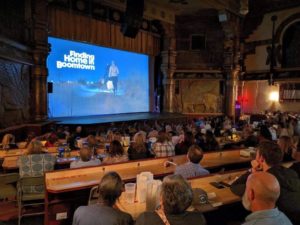
Soon thereafter, Community First announced a four-month internship program for the purpose of training others who had a similar vision. “I thought that was a neat idea, but we had just built a house, had just had a baby, and we were pretty settled.”
But the idea of doing the internship would not let go. Yet he didn’t know how to broach the topic with his wife. “I was sitting at work one day, and I sent her a text message to finally force the conversation, ‘Hey can we talk tonight?’ And she texted back and said, ‘Oh, do you think we should sell our house?’”
It was obvious then that they were on the same page.
It’s right about here that the movie starts—they’re selling their home, buying a trailer to live in at Community First—and working through some parental resistance.
John-Mark and Briana both worked in the oil and gas business, with income totaling a solid six figures. Briana had spent a good amount of her childhood with her single mom in difficult financial straits—in mobile home parks. John-Mark’s parents lived in a house that they’d enlarged to more than 7,000 square feet. In spite of varied and well-intentioned questions resistance was futile, all of which is candidly documented in the film.
The Movie Idea
The Echolses had met filmmakers Matt and Katie Maxwell in 2013, when the latter filmed the former’s wedding. Maxwell notes that they always befriend their photography clients, but this was something special. The Echolses later brought the Maxwells to Cloudcroft to shoot the former’s maternity photos.
Matt’s quest for higher education in moviemaking triggered the film opportunity. “When I pursued an MFA [Master of Fine Arts] from Vermont College of Fine Arts… I was looking for some stories that I could film and document, purposely looking for some short stories.”
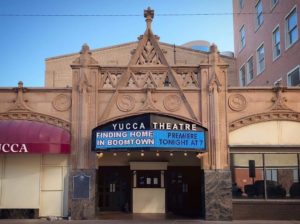 His first ideas were about showing off the things oil money could accomplish. “It’s a small town in the middle of west Texas—with lots of money.” He was particularly impressed by neighborhoods with huge houses. But the angle and the direction never clicked.
His first ideas were about showing off the things oil money could accomplish. “It’s a small town in the middle of west Texas—with lots of money.” He was particularly impressed by neighborhoods with huge houses. But the angle and the direction never clicked.
The Maxwells’ own journey to Midland and this film leads across Texas, California, and back. After growing up in Abilene and graduating from Abilene Christian University, Maxwell married Katie, and they decided to “take a risk and move to Hollywood, where we did the entertainment industry.”
Matt had success in production and Katie had a great career in the talent agency world. But a family calling created their own moment of truth. “We began to realize that all of our friends and family back home were starting their own families—and the culture in L.A. was so different from what we grew up in in West Texas,” Maxwell said. They’d married when he was 23 and she was 25, and this family urge began to grow as they reached their thirties. But “people don’t start families [in Hollywood] until they’re in their forties, and there are lots of reasons for that.”
When Golf Course Road Church of Christ had an opening for a media person, they decided, after some hesitation, to move back closer to family. In the process, they found Midland quite different from both L.A. and Abilene. “It was culture shock when we moved from Abilene to L.A., then it was just this whole other culture shock moving from L.A. to Midland.” This is one reason those large homes made such an impression on Maxwell.
As she saw her husband struggle with making big homes a focus for his film, Katie told him that the Echols were selling their home and moving into a trailer to pursue the goal of helping the homeless.
Matt approached the Echolses, who agreed. So began a two-year process that included filming the birth of the Echols’ second child, parental reluctance, jamming three people and two large canines into a travel trailer and the funeral of a homeless woman whom John-Mark had ministered to as part of working at Breaking Bread Kitchen while building The Field’s Edge. There were appearances by Midland Mayor Jerry Morales, the Midland County Commissioner’s Court, including TFE board member and commissioner Randy Prude, realtor Victoria Printz, and others.
Filming such intimate moments “was a very vulnerable position to be in,” Echols admitted, “but it was important that we really knew and trusted Matt Maxwell to care for our story—and he did, so that’s why it was easy for us to let him in to all that.”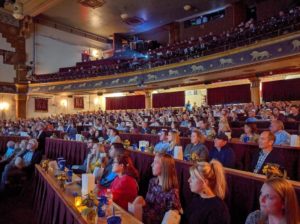
At the start, there was the realization that the Echolses might go to Austin and decide instead to return to the oil business—something all parties were aware of and were okay with. Said Maxwell, “The caveat is, if something goes south, that’s going to be in the film.”
Through that, Maxwell said he learned that “Every life is interesting—and every story is worth telling.” At first he didn’t think the Echolses’ story was interesting, but as it developed, he saw the depth of the human experience unfold before him.
The film has been well received at festivals around the country—the Midland premiere was Thursday night, October 17, at the Yucca Theatre. The premiere and the film were underwritten by numerous area business and individuals—something that John-Mark Echols said is very humbling. “What we’re doing is not possible without the support of our community—without the support of the oil and gas community,” he said. “It’s really cool to be part of something that’s bigger than us, that requires so many different types of people, and we’re just thankful to be part of such a generous and giving community.”
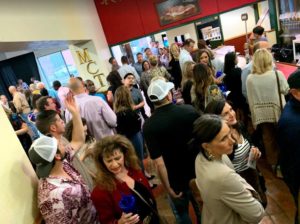 It may be ironic that a community often listed among those with the highest per-capita income in the United States has hundreds of homeless. But Echols and Maxwell both noted that the very prosperity and growth brings higher costs of living, which can leave many behind. In recent years, area social services have increasingly filled needs from those who are working, but are not making enough to cover necessities.
It may be ironic that a community often listed among those with the highest per-capita income in the United States has hundreds of homeless. But Echols and Maxwell both noted that the very prosperity and growth brings higher costs of living, which can leave many behind. In recent years, area social services have increasingly filled needs from those who are working, but are not making enough to cover necessities.
And one may say there are jobs aplenty, but as the families learned, homelessness is not that simple—and just finding a job may not be enough to cover rent, transportation, food, health, and other needs in this economy.
The web address for the ministry is www.thefieldsedge.org.
______________________________________________________________________________________________________
By Paul Wiseman









